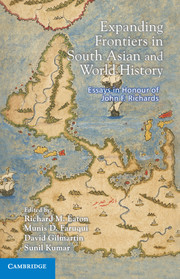Book contents
- Frontmatter
- Contents
- List of Contributors
- Foreword
- Introduction
- 1 At Empire's End: The Nizam, Hyderabad and Eighteenth-century India
- 2 The Ignored Elites: Turks, Mongols and a Persian Secretarial Class in the Early Delhi Sultanate
- 3 ‘Silk Road, Cotton Road or … Indo-Chinese Trade in Pre-European Times’
- 4 The Political Economy of Opium Smuggling in Early Nineteenth Century India: Leakage or Resistance?
- 5 Opium and the Company: Maritime Trade and Imperial Finances on Java, 1684–1796
- 6 The Mughals, the Sufi Shaikhs and the Formation of the Akbari Dispensation
- 7 Notes on Political Thought in Medieval and Early Modern South India
- 8 Becoming Turk the Rajput Way: Conversion and Identity in an Indian Warrior Narrative
- 9 Nature and Nurture on Imperial China's Frontiers
- 10 The Frontiers of Memory: What the Marathas Remembered of Vijayanagara
- 11 ‘Kiss My Foot,’ Said the King: Firearms, Diplomacy and the Battle for Raichur, 1520
- 12 Frontiers of Family Life: Early Modern Atlantic and Indian Ocean Worlds
- 13 Chinese Revenue Farms and Borders in Southeast Asia
- Publications
- Index
9 - Nature and Nurture on Imperial China's Frontiers
Published online by Cambridge University Press: 05 January 2014
- Frontmatter
- Contents
- List of Contributors
- Foreword
- Introduction
- 1 At Empire's End: The Nizam, Hyderabad and Eighteenth-century India
- 2 The Ignored Elites: Turks, Mongols and a Persian Secretarial Class in the Early Delhi Sultanate
- 3 ‘Silk Road, Cotton Road or … Indo-Chinese Trade in Pre-European Times’
- 4 The Political Economy of Opium Smuggling in Early Nineteenth Century India: Leakage or Resistance?
- 5 Opium and the Company: Maritime Trade and Imperial Finances on Java, 1684–1796
- 6 The Mughals, the Sufi Shaikhs and the Formation of the Akbari Dispensation
- 7 Notes on Political Thought in Medieval and Early Modern South India
- 8 Becoming Turk the Rajput Way: Conversion and Identity in an Indian Warrior Narrative
- 9 Nature and Nurture on Imperial China's Frontiers
- 10 The Frontiers of Memory: What the Marathas Remembered of Vijayanagara
- 11 ‘Kiss My Foot,’ Said the King: Firearms, Diplomacy and the Battle for Raichur, 1520
- 12 Frontiers of Family Life: Early Modern Atlantic and Indian Ocean Worlds
- 13 Chinese Revenue Farms and Borders in Southeast Asia
- Publications
- Index
Summary
INTRODUCTION
John Richards' The Unending Frontier is a magisterial survey of the formation of a globally connected society in the early modern age. For Richards, the main forces creating a global society were ‘a critical conjuncture between two developments: the expansive dynamism of European early modern capitalist societies, and the shared evolutionary progress in human organization that appears to have reached a critical threshold across Eurasia, if not the entire world’. These two forces—markets and states—drove the increasingly intensive exploitation of natural resources around the globe, uniting continents, empires and traders in a tighter network of trade and administration. It is a brilliant synthesis of environmental and political history, which will shape all future work on this period.
For Richards, frontiers are sites of penetration by outsiders seeking control over borders and productive natural resources. A relentless process of warfare, consolidation, investment and exploitation of nature leads over the long run to heavy resource usage, and often exhaustion, driving the conquerors to push farther into the hinterlands in search of further gains. Native peoples of the frontier borderlands, for the most part, are merely victims of the much more powerful organized states and trading companies around them.
Although the nineteenth century is not the subject of this book, and the North American continent appears only in discussion of the fur trade, the ghost of Frederick J. Turner still hovers over Richards' work. It is now not a uniquely American story, but a global one, and it begins three centuries earlier. Still, the story of penetration of empty or underutilized lands and their increasingly intensive exploitation resonates with Turner’s original account.
- Type
- Chapter
- Information
- Expanding Frontiers in South Asian and World HistoryEssays in Honour of John F. Richards, pp. 232 - 254Publisher: Cambridge University PressPrint publication year: 2013

